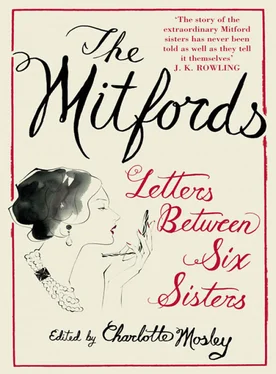Nancy spent the ‘phoney war’, the months between the declaration of war and Hitler’s invasion of Norway and Denmark in April 1940, working in London at a first-aid post and writing her fourth novel, Pigeon Pie, a comic spy story that did not sell well. Peter joined up, ‘looking very pretty’ in his uniform, and they had a brief retour de flamme which resulted in a second miscarriage for Nancy. It was a depressing time and in her unhappiness she lashed out at her sisters: Deborah was ‘having a wild time with young cannon fodders at the Ritz’; Jessica was attacked for living in America: ‘You must be mad to stay there & like all mad people convinced you are sane’; Unity, whose suicide attempt had not yet reached the ears of her family, was rumoured to be in a concentration camp which was ‘a sort of poetic justice’; Pamela was living at Rignell, ‘in a round of boring gaiety of the neighbourly description’. Where Diana was concerned Nancy exulted when ‘Sir Oswald Quisling’ was imprisoned but thought it quite useless ‘if Lady Q is still at large’. Her hostility towards Diana did not stop at angry words. In June 1940, she was summoned by Gladwyn Jebb, an official at the Foreign Office, to give information on what she knew about Diana’s visits to Germany. She told him that she considered her ‘an extremely dangerous person’. ‘Not very sisterly behaviour’, she admitted to a family friend, ‘but in such times I think it is one’s duty?’ According to an MI5 report of the time, Nancy also informed on Pamela and Derek who she thought should be kept under observation because of being ‘anti-Semitic, anti-democratic and defeatist’.
Although Diana would probably have been interned regardless of Nancy’s character reference, her sister’s testimony must have lent support to the government in their decision to detain her. She was arrested on 29 June 1940 and sent to Holloway, a women’s prison in north London. Diana did not learn of Nancy’s act of disloyalty until 1983, ten years after her death. Had she known, it is likely that she would have cut Nancy out of her life for ever. Even if she had wanted to keep up some kind of communication with her, it is certain that Mosley would have forbidden it. In the event, once Diana was in prison, the five-year estrangement between the two sisters, that had started with Wigs on the Green, began to heal. After the novel’s publication, Nancy had written just twice to Diana, to congratulate her on the births of her two Mosley sons, which, by painful coincidence, had occurred within a few weeks of Nancy’s two miscarriages. While Diana was in Holloway, prison regulations restricted her letter-writing but when she was released in 1943 and was living under house arrest the correspondence between them resumed. This was in spite of Nancy having once again performed her patriotic duty by going to the authorities when the Mosleys’ release was announced and volunteering that in her opinion Diana should not be let out of prison because she ‘sincerely desires the downfall of England and democracy generally’. Diana was never to know about this second betrayal as the government papers in which it was recorded were not made public until four months after her death.
During the first two years of the war, Nancy worked in a canteen for French soldiers evacuated from Dunkirk and later looked after Jewish refugees billeted at Rutland Gate. In 1942, she found a job more to her liking at Heywood Hill, a bookshop in Mayfair, which soon became a meeting place for her London friends. In the same year she met Gaston Palewski, a Free French officer who was General de Gaulle’s right-hand man in London and who very quickly became the love of her life. This cultivated, sophisticated and amusing man was a passionate lover of women and a fiercely loyal supporter of de Gaulle – qualities that made up for his lack of physical charm. The ‘Colonel’, as Nancy always called him, worked the same powerful effect on her as Hitler, Mosley and Esmond had on her sisters. She became as indiscriminately pro-French as Unity had been pro-German; as ready to swallow her pride and put up with Palewski’s infidelities as Diana was with Mosley’s; as convinced that Gaullism was the answer to France’s problems as Jessica was that communism would solve the world’s injustices. Although Palewski was not in love with Nancy – and never pretended to be – he made her feel desired in a way that no other man had. The eight months that their affair lasted before he left to join de Gaulle in Algeria were among the happiest in her life and inspired The Pursuit of Love, the novel that made her famous. It is not clear when Nancy told her sisters about the affair; Palewski is not mentioned in her surviving letters until after the end of the war.
Oswald Mosley’s message to his supporters on 9 May 1940 to ‘resist the foreign invasion with all that is in us’ did not forestall his arrest. On 23 May 1940, he was sent to Brixton Prison under Defence Regulation 18B, which enabled the government to detain without trial anyone suspected of being a threat to the country. Diana, an ‘extremely dangerous and sinister young woman’ according to the Home Office official who signed her detention order, was arrested a month later. In October, she appeared before an Advisory Committee appointed to decide whether she should remain incarcerated. Diana treated her hearing with contempt, as ‘an absurd and insulting farce’, an attitude that she later admitted to regretting. Her loyalty to her friendship with Hitler and her refusal to repudiate Nazi policies led to the recommendation that she be kept locked up. On her arrest, Diana left her two youngest sons, Alexander, who was eighteen months old and Max, who was just eleven weeks and not yet weaned, with their nanny. Lady Redesdale would have taken them to live with her but she was fully occupied caring for Unity, so the children went to live at Rignell with Pamela, whose nickname ‘Woman’ belied the fact – unluckily for the little boys – that she was the least maternal of the sisters. After a year and a half at Rignell, they went with Nanny Higgs as paying guests to the new owners of Swinbrook House. Diana missed her four children terribly and their occasional brief visits were overshadowed by the anguish of having to part with them. But her greatest complaint was being separated from Mosley. Other couples detained under 18B had been moved to married quarters and the Mosleys began to press for permission to be housed together. At the end of 1941, they were reunited in Holloway and lodged in a flat in the prison grounds where they spent two further years in detention. In the autumn of 1943 Mosley contracted phlebitis and the prison doctors reported that his life could be in danger. The Mosleys were released in November and settled at Crux Easton, near Newbury, where they remained under house arrest until the end of the war. The government’s decision to release them was met with a storm of protest and countrywide demonstrations.
Nancy was not the only sister to remonstrate against the decision to free the Mosleys: Jessica wrote to Winston Churchill to demand that they be kept in jail because their release was a ‘direct betrayal of those who have died for the cause of anti-fascism’, and she sent a copy of her letter to the San Francisco Chronicle . In her second volume of memoirs, A Fine Old Conflict, Jessica wrote that on re-reading this letter thirty years later, she found it ‘painfully stuffy and self-righteous’, and noted that Nancy had written condemning her action as ‘not very sisterly’ – the very same words that Nancy had used for her own behaviour when she denounced Diana in 1940. Jessica’s views, as she herself honestly admitted, were mixed with a ‘goodly dash of familial spitefulness’ and with bitterness over Esmond’s death in action in 1941. There is no evidence that Nancy ever told Jessica that she too had denounced Diana, or conceded that in performing her ‘duty’ she might also have been acting with a not insignificant dash of sisterly spite – and without Jessica’s justification of having lost a husband in the fighting.
Читать дальше












